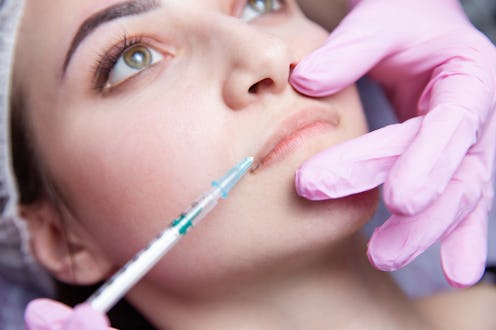Style
The Government's Plan To Stop Botched Plastic Surgery Uses This Very Simple Method

A few years ago, admitting that you'd had work done to your face or body was more taboo. Now, though, the likely reaction would merely be a shrug of the shoulders. A "so what?" Thanks to the openness of reality TV stars and social media advertising, injectables have been normalised. A new government campaign aiming to stop botched cosmetic procedures wants to change that way of thinking.
England's Department of Health told the BBC's Victoria Derbyshire programme that a campaign will be launching in the next few weeks. By educating the public on Instagram-favoured procedures, the government hopes to reduce the number of problematic outcomes being reported.
But will it work? After all, there are plenty of examples of botched plastic surgery on TV and in the media. Yet the desire to book an appointment still exists for many.
A recent Victoria Derbyshire and Newsbeat survey of 1,033 women aged between 18 and 30 found that seven percent of respondents had had a cosmetic procedure in the past. (Lip fillers and Botox were the most common.) And 83 percent said they would change some part of their body if they didn't have to worry about finances or health implications.
Watching celebrities plus the average person completely transform their appearance doesn't just have an impact on women. Men, too, are being affected. The aforementioned BBC survey also asked the same questions to 1,000 men. Almost half of male respondents said they "might consider" having a cosmetic procedure. The face didn't feature heavily on the male list. Instead, the stomach and chest were the main concerns.
Nora Nugent, a member of the council of the British Association of Aesthetic Plastic Surgeons, told the BBC that she welcomed the upcoming governmental campaign, but also highlighted the lack of regulation surrounding injectables.
This call for tighter rules has already been echoed by doctors and politicians. As the Guardian reports, much of the commotion has been focused on dermal fillers. These are injections "used to fill out wrinkles and creases in the skin," states the NHS. Fillers are also popular as lip and cheek enhancers.
While permanent fillers are often avoided, even temporary ones come with a variety of risks. According to the NHS, potential side effects range from swelling, rashes, and bruising to infections and the possibility of the filler moving away from where it was originally injected. In rare cases, the material used may form a lump under the skin or block a blood vessel, possibly leading to permanent blindness, tissue death, or a life-threatening lung issue.
In theory, trained medical practitioners should be able to inject fillers with little to no complications arising. If a problem does occur, such a person would have the knowledge to deal with it. The issue is that you don't have to be a nurse or doctor to administer certain injectables. As Nugent pointed out to the BBC, beauticians — who may not have professional medical credentials — are currently able to offer fillers.
Accredited practitioner register Save Face said it had received more than 600 complaints about dermal fillers between 2017 and 2018. Dr. Christian Jessen's statement to Closer explains how such a high figure could have come about.
"Filler is usually made up of hyaluronic acid which, unlike anti-wrinkle injections such as Botox, doesn’t require a prescription," he said. "Essentially, a person can order filler online and start injecting into their own on another person’s face with no licence or training. Young girls who want to emulate their favourite reality stars are often swayed by the cheap prices charged by these untrained people. But it’s unregulated and that’s where the danger lies."
It seems, then, that a campaign focused on education won't have the impact the government is looking for. Time for a legal overhaul, I think.